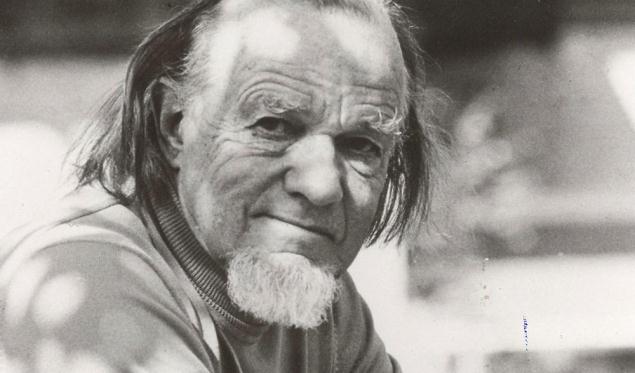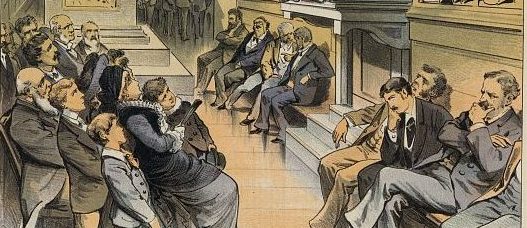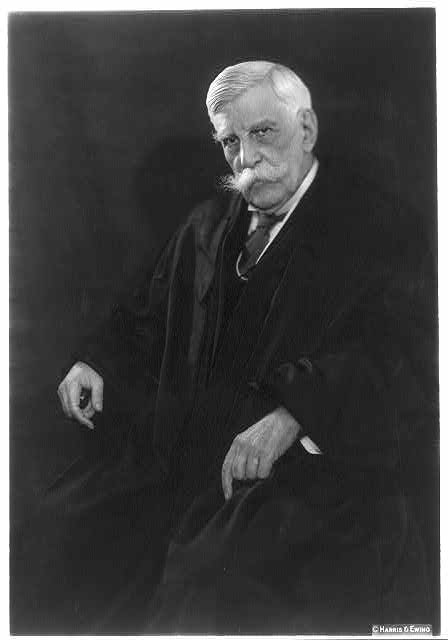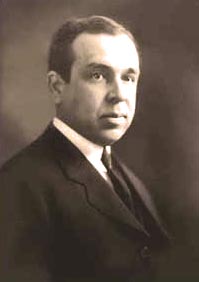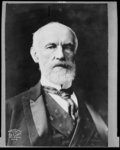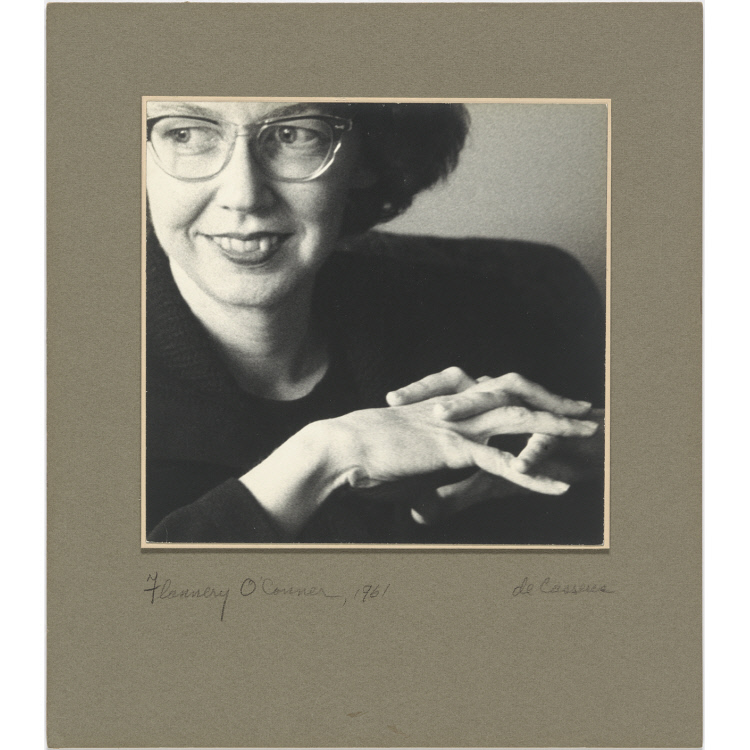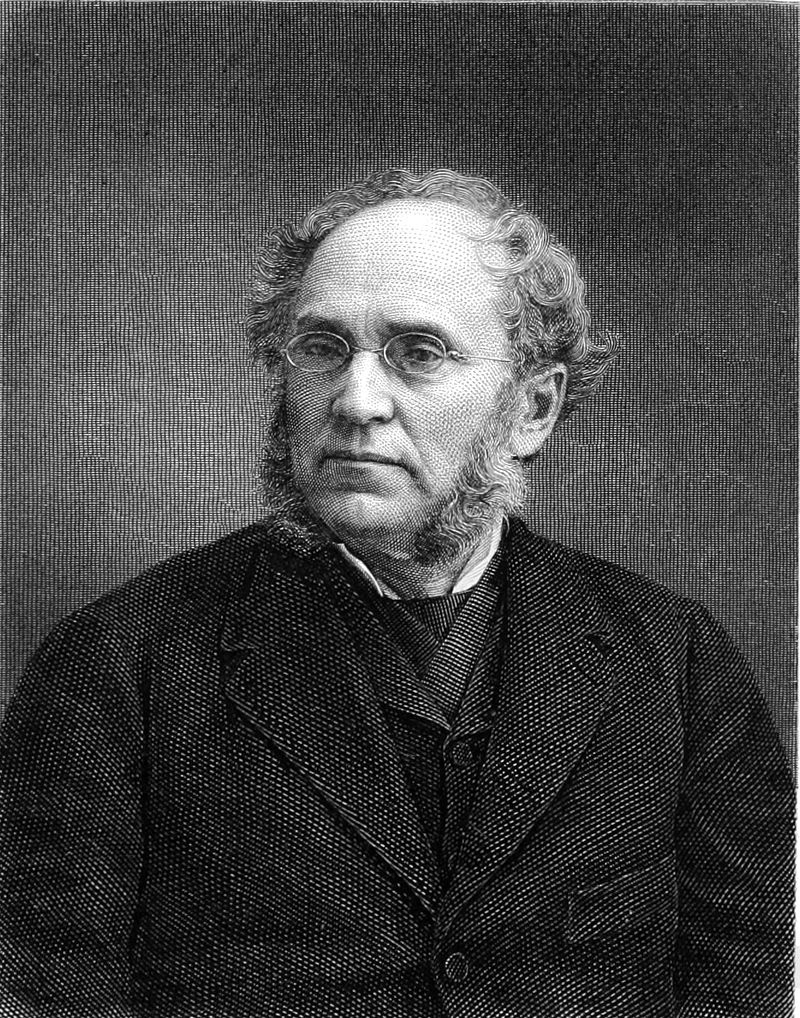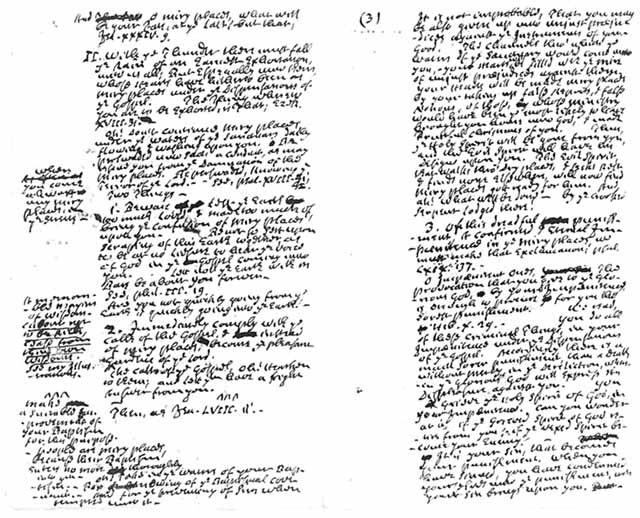Philosophy in the United States
G. Stanley Hall
January 1879
In this article, Hall described higher education in America just as it began a period of transition: until the late nineteenth century, virtually all colleges in the United States were founded by religious denominations and most college presidents were ordained ministers.
One of the 25 Core Documents
Go to Study Questions
Introduction
As Hall noted, undergraduates typically studied ethics under the college president in their final year, which ensured the course reflected religious or denominational views. As the influence of modern science increased, exemplified by the growing acceptance of evolution and historical ways of thinking, clerical control of education came under question and attack. The tone of Hall’s article as well as his explicit criticisms showed he was in favor of secularizing education, especially the teaching of philosophy. In addition to conveying the growing strength of secular views, Hall’s article also makes clear the influence of German historical thought (Hegel) and the separate and even greater influence, according to Hall, of evolution was a broader set of ideas than those expressed by Darwin. Perhaps as many as 10,000 Americans went to Germany to study in the nineteenth century (Hall was one of them). When these scholars returned to America and took up positions in the new research universities financed with America’s new industrial wealth (e.g., the University of Chicago, Cornell University, Johns Hopkins, Stanford University), they became part of a revolutionary change in the way Americans thought about their society and political life.
Hall’s Essay
There are nearly 300 non-Catholic colleges in the United States, most of them chartered by the legislatures of their respective states, and conferring the degree of A.B. upon their students at the end of a four years’ course, and A.AM.1 three years after graduation. In nearly all these institutions certain studies, aesthetical, logical, historical, most commonly ethical, most rarely psychological, are roughly classed as philosophy and taught during the last year almost invariably by the president. The methods of instruction and examination are so varied that it is impossible in the space at our disposal to report in detail upon the nature and value of the work done in these institutions. More than 200 of them are strictly denominational, and the instruction given in philosophy is rudimentary and mediæval. More than 60 which in the annual catalogue claim to be non-sectarian are, if not pervaded with the spirit of some distinct religious party, yet strictly evangelical. Indeed there are less than half a dozen colleges or universities in the United States where metaphysical thought is entirely freed from reference to theological formulae. Many teachers of philosophy have no training in their department save such as has been obtained in theological seminaries, and their pupils are made far more familiar with the points of difference in the theology of Parks, Fairchilds, Hodges and the like, than with Plato, Leibnitz or Kant. Many of these colleges were established by funds contributed during periods of religious awakening, and are now sustained with difficulty as denominational outposts by appeals from the pulpit and sectarian press. The nature of the philosophical instruction is determined by the convictions of constituencies and trustees, while professors are to a great extent without independence or initiative in matters of speculative thought. The philosophical character of some institutions is determined by the conditions attached to bequests. A few are under the personal and perhaps daily supervision of the founders themselves, who engage and discharge the members of their faculties as so many day-labourers, and who are likely to be religious enthusiasts or propagandists.
The traditional college régime in the United States was designed to cultivate openness and flexibility of mind by introducing the student hastily to a great variety of studies, so that his own tastes and aptitudes might be consciously developed as guides to ulterior and more technical work. The method of philosophical indoctrination, in striking contrast to this, seeks to prevent the independent personal look at things, and to inoculate the mind with insidious orthodoxies which too often close it for ever to speculative interests. The great open questions of psychology and metaphysics are made to dwindle in number and importance as compared with matters of faith and conduct.… It is, in any case, plain that there is very small chance that a well-equipped student of philosophy in any of its departments will secure a position as a teacher of the subject. He may find a career as a writer, editor, or instructor in other branches, or he may bring his mind into some sort of platonising conformity with the milder forms of orthodoxy and teach a philosophy with reservations. That most of the instructors find the limitation of their field of work galling is by no means asserted or implied. Many of them feel no need of a larger and freer intellectual atmosphere. They have never been taught to reason save from dogmatic or scriptural data.… [A]ll these institutions unite in impressing upon their students the lesson that there is an abyss of scepticism and materialism into which, as the greatest of all intellectual disasters, those who cease to believe in the Scriptures as interpreted according to the canons of orthodox criticism, are sure to be plunged.
The spirit and aims of philosophical instruction in very many of the smaller colleges have found an admirable exponent in the Boston Monday lectureship of the Rev. Joseph Cook, whose discourses, now published in several volumes, have had an immense influence upon the semi-theological philosophy of all such centers of learning as we have just characterized.… [In these lectures] with much liberality of interpretation, scriptural doctrines are compared with [summaries of philosophy], all in a conciliatory spirit: but wherever the teachings of science or philosophy are judged to vary from those of Scripture, the supreme authority of the latter is urged with all that intensity of a fervid and magnetic personality which makes dogmatism impressive and often even sublime. The mere brute force of unreasoned individual conviction, which Hegel so wittily characterizes as the animal kingdom of mind, has a peculiar convincing eloquence of its own in religious matters, which, acceptable as it often is to faith, has long been one of the stumbling-blocks in the way of philosophy in America.
Another reason for the backward condition of philosophy in most of these institutions is found in their poverty. A few of them were established by real estate companies to help the sale of land. By the negligence of the more worthy members of trustee-boards, together with mistaken provisions to fill vacancies, others have fallen under the control of ward-politicians, and professorships are retained or declared vacant by a scarcely better than popular suffrage. Still others are under the immediate control of state legislatures, which have it in their power to reduce or even to withhold the annual appropriation. Nearly all of them are poorly endowed, and some are entirely without funds save those accruing from tuition fees; and thus, so numerous are they, so sharp is the competition for patronage, and so quick and sagacious is parental jealousy of any instruction which shall unsettle early and home-bred religious convictions, that it is not surprising that there is little philosophical or even intellectual independence to be found in these institutions.…
While thus business conspires with Bethel2 to bring mental science into general disfavor, the average American college is in no position to lead or even to resist popular opinion and sentiment, supposing it inclined to do so. The shrewd practical money-making man, even in one of the learned professions, can make little use of philosophy; indeed it is liable to weaken his executive powers and make him introspective and theoretical. The popular philistinism which we have heard impressed as a weighty philosophical motto in the exhortation, “Look outward not inward, forward not backward, and keep at work,” and which seems no more rational than the superstitious aversion to science in the Middle Ages, has been strangely efficacious against philosophical endeavor here. Hence all branches of mental science have come to be widely regarded as the special appanage3 of a theological curriculum, where despite the limitations above described a little speculation is a trifle less dangerous than for a practical businessman.
The above, however, we hasten to say, is the darker side of the picture and is truer in general of Western than of Eastern colleges. The most vigorous and original philosophical instruction is almost everywhere given in ethics, though like nearly all other subjects it is taught from textbooks.… The work with textbooks is commonly supplemented by lectures where ethical principles are applied to law, trade, art, conduct, &c., in a more or less hortatory manner. The grounds of moral obligation are commonly deduced from Revelation, supplemented by the intuitions of conscience, which are variously interpreted. The practical questions of daily life are often discussed in the classroom with the professor with great freedom, detail and interest. Current social or political topics are sometimes introduced, and formal debates by students appointed beforehand by the professor, and followed by his comments, may occasionally take the place of regular recitations and lectures.… On the whole the average student completes his course in moral science with the conviction that there is a hard and fast line between certain definite acts and habits which are always and everywhere wrong, and others which are right; that above all motives, circumstances, insights, the absolute imperative of conscience must determine the content as well as the form of actions. The psychological nature and origin of conscience are questions which have excited very little interest.
…The serious and introspective frame of mind which religious freedom and especially pietism tends to develop; the enterprise and individuality which are characteristic of American life, and which have shown themselves in all sorts of independent speculation; the principle of self-government, which in the absence of historical precedents and tradition inclines men to seek for the first principles of political and ethical science, have combined to invest semi-philosophical themes with great interest even for men of defective education. From the pulpit and even in the adult Sunday-school class or the debating society, in the club-essay and the religious press, metaphysical discussions are often heard or read, and not infrequently awaken the liveliest discussions. Yet, on the other hand, dogmatism and the practical spirit have combined thus far quite too effectually to restrain those who might otherwise have devoted themselves to the vocation of thinking deeply, fearlessly and freely on the ultimate questions of life and conduct. If “philosophers in America are as rare as snakes in Norway,” it is because the country is yet too young. The minds of business and working men, whether skeptical or orthodox, have short, plain, and rigid methods of dealing with matters of pure reason or of faith, and are not always tolerant of those who adopt other and more “unsettling” ones. If, however, we may find in Hegel’s Phenomenology a program of the future, the hard common sense which subdues nature and organizes the objective world into conformity with man’s physical needs will, at length, when it has done its work, pause in retrospect, and finally be reflected as conscious self-knowledge which is the beginning of philosophical wisdom. As a nation we are not old enough to develop, and yet too curious and receptive to despair of, a philosophy.
As we pass either from the smaller to the larger or from the Western to the Eastern institutions, we find in general a much better condition of things. The older Edwards,4 the influence of whose writings is still very great upon the religious philosophy of New England and the Middle States, did much to rationalize Calvinism and to inspire confidence in the verdicts of reason. In his great work on the freedom of the Will, he taught that the essence of right and wrong lies in the nature of acts and motives and not in their cause, that spontaneity and not self-determination is the characteristic of a free act. Subjectively, virtue is the love of being in general. Adam’s sin was not imputed to his descendants, but its effects were naturally transmitted as the withdrawal of higher spiritual influences. The new birth5 is not the advent of a new but the new activity of an old principle. The disciples of Edwards6—Dr. Dwight, C. G. Finney, E. A. Parks, Horace Bushnell, Moses Stuart, and many others—have modified and widely extended his opinions.
…Outside of schools and colleges, philosophical interests have taken on the whole a wide range. Trendelenburg, Schleiermacher, Krause, Schelling, Fichte, Herbart and Lotze7 have all found more or less careful students and even disciples among men of partial leisure in the various professions, who have spent the last year or two of student life in Germany. Above all these, however, stand first the influence of Hegel, which since 1867 has been represented by the quarterly Journal of Speculative Philosophy, edited by Wm. T. Harris of St. Louis, and secondly that of Herbert Spencer and other English evolutionists, which has been greatly extended by the Popular Science Monthly, edited by Dr. E. L. Youmans of New York. Mr. Harris … as superintendent of the public schools of his city … has had but little time for original contributions to his Journal, but all English students who wish to understand Hegel’s Logic, particularly the third part, should not fail to read Mr. Harris’s compendious articles as part of the necessary propaedeutic.8 He has gathered about him a circle of young men who have been led by his influence to interest themselves in German speculations, and whose contributions are found in nearly every number of the Journal.
…[Harris] has from the first carefully studied the bearings of philosophical speculation upon methods of education, and the high character of the schools under his care and the wide interest felt among teachers in his annual reports, bear witness to the discretion with which abstract principles have been utilized as practical suggestions. German pedagogical methods have also been introduced to the notice of teachers in the pages of the Journal.…
The appearance of such a journal in America, and above all in a great center of western trade, supported by enthusiastic self-trained thinkers who had the hardihood to attempt to translate into Anglo-Saxon the ponderous nomenclature of the absolute idealism of the Wissenschaftslehre9 and the Hegelian Logic, has been often spoken of as surprising and even anomalous. The explanation, however, may not be far to seek. There is perhaps no spot in America where during the last quarter of a century illustrations of the powers of the human mind over nature have been so numerous and so impressive as in St. Louis. In a city so young and so large, the geographical and commercial center between west, east, and south, the inference that in a more than poetic sense thought is creative and man is the maker of the world, is not merely congenial, but to a certain degree spontaneous and irresistible. Again there is such a pleasing sense of liberty in the perpetual recurrence of dialectic alternatives, and yet of security, inspired by the regularity with which the beats and clicks of the triadic engine10 are heard, and above all there is such a largeness and scope in the formula of Hegel, as if the Universe itself might be “done” once for all by reading a few thousand pages, that it is no wonder his sun should rise upon the new as it sets in the old world. Where every thing is an open question it is pleasing to feel that “all progress is advancement in the consciousness of freedom.”11 But this is not all. No one can spend a week among the philosophical coteries of St. Louis without feeling—still more perhaps than by reading the Journal—that these causes, aided by the influences of reaction from a severely practical and business life, have awakened the faculty of philosophy to a most hopeful and inquiring receptivity. There seems scarcely a doubt that, should Mr. Harris decide to open his journal to psychological as well as to metaphysical discussions, and in preference to the aesthetical selections which have been so often weary and unprofitable, it would soon become not only self-supporting but remunerative.
…In Germany it is said that Hegelianism has been an excellent Vorfrucht12 to prepare the philosophical soil for the theories of evolution. It limbers and exercises without fevering the mind, making a safe and easy transition from the orthodox to the scientific standpoint. Even its adversaries often admit that as a mental discipline at a certain stage of philosophical culture it is unsurpassed. However this may be, it is certain that the theories of Herbert Spencer, G. H. Lewes and other English evolutionists, which have exerted such an immense influence in the United States during the last decade, are not indebted to Hegelianism, but are represented almost entirely by scientific men not especially interested in the history of speculation. If the worst side of the American college is the philosophical, its best is the scientific department. The value and thoroughness of the work done here is probably too little appreciated abroad. While in some of the smaller colleges it is poor enough, in many others the professors have had a thorough European training and lack only leisure and library and laboratory opportunities for valuable and original work. With comparatively few exceptions, all the most competent teachers of natural or physical science either tacitly accept or openly advocate the fundamental principles of evolution. Even the most orthodox institutions are often no exceptions to this rule. One of the largest of these long and vainly sought for a professor of zoology who would consent to pledge himself beforehand to say nothing in favor of Darwinism. In eight or nine out of more than thirty of those institutions which the writer has visited, instructors in this department are allowed to teach the principles of Huxley and Haeckel,13 if they wish, unmolested. It must be said, however, that very often the adoption of the formulae of the development theory is so premature as seriously to interfere with the patient mastery of scientific details, or, through the students’ impatience with other methods, to lower the standard of work and attainment in other departments. In a country of such remarkably rapid development as our own, where the ploughboy is never allowed to forget that he may become a millionaire or even President if he wills it earnestly enough, the catchwords of evolution often excite an enthusiasm which is inversely as the power to comprehend its scope and importance. Many of the more semi-popular aspects of Herbert Spencer’s philosophy have been admirably presented by Mr. John Fiske in courses of lectures in Harvard University, in Boston, New York, and in several of the Western cities. In the periodical, especially the religious, press criticisms almost without number have been published. Professor Bowne of the new Boston University has elaborated his strictures of Herbert Spencer into a small volume which is one of the most subtle and forcible criticisms of the First Principles and the Psychology14 that have ever proceeded from an essentially evangelical standpoint.15
…Perhaps the most general characteristic of American intellectual life is its heterogeneity. Not only has each religious sect or denomination its own revered and authoritative founders or reformers, its own newspapers and literature, and often its own set of duties and associations, beyond the limit of which the thoughts and interests of its more uneducated members rarely pass, but also many semi-philosophical sects have a more or less numerous representation.…
The influence of German modes of thought in America is very great and is probably increasing: Du Bois Reymond16 observed in a public address some years ago that no two countries could learn so much from each other. Scores of American students may be found in nearly all the larger German universities. Most of even the smaller colleges have one or two professors who have spent from one to three or four years in study in that country, whose very language is a philosophical discipline. The market for German books in the United States is in several departments of learning larger than in Germany itself, though this is partly, of course, to be accounted for by the number of German residents. The Hegelianism of St. Louis was not only first imported but has always been to some extent supported by native Germans.
…Protestantism in America has its well-developed grammar of dissent, and has been in the past an invaluable philosophical discipline. The American, perhaps, even more than the English, Sunday might almost be called a philosophical institution. A day of rest, of family life and introspection, it not only gives seriousness and poise to character and brings the saving fore-, after-, and over-thought into the midst of a hurrying objective and material life, to which its wider sympathies and interests and new activities are a wholesome alternative, but it teaches self-control, self-knowledge, self-respect, as the highest results of every intellectual motive and aspiration. In its most developed forms, especially among the Unitarians, Protestantism has more or less completely rationalized not only the dogmas of theology but their scriptural data, and now inculcates mainly the practical lessons of personal morality and the duty of discriminative intellectual, political and esthetical activity.
Finally we shall venture to call patriotism a philosophical sentiment in America. It is very deeply rooted and persistent even in those who take the most gloomy view of the present aspect of our political life, who insist that the Constitution needs careful and radical revision, and who are not disposed to overrate the magnitude of events in our national history thus far. It is philanthropic, full of faith in human nature and in the future. And if, according to a leading canon of the new psychology,17 the active part of our nature is the essential element in cognition and all possible truth is practical, then may we not rationally hope that even those materialisms of faith and of business which we now deplore, are yet laying the foundations for a maturity of philosophical insight deep enough at some time to intellectualize and thus harmonize all the diverse strands in our national life?
Study Questions...
View All
What is Hall’s attitude toward religion? Does he see philosophy as the antagonist of religion? What explains this attitude?
Compare...
How do the views expressed by Hall and Youmans differ from those expressed by Palmer and Henry Ward Beecher?
Notes
1 Currently referred to as the B.A. and M.A. degrees.2 The Church.
3 A grant of land or a title from a King to a subject not provided for by rules of inheritance.4 Jonathan Edwards (1703–1758). See document XX.
5 The experience of being born again. See Moody, document XX.
6 Jonathan Edwards. See A Discourse Concerning Unlimited Submission and Non-resistance to the Higher Powers
9 Wissenschaftslehre, theory of knowledge or science, was the title of a work by Fichte.
10 The three phases of Hegel’s dialectic, thesis, antithesis, synthesis.
11 A quotation or paraphrase from Hegel’s Philosophy of History.
12 This German word means a previous crop, as in a crop rotation system which uses certain crops to put nutrients into the soil. In other words, the study of Hegel is preparation for understanding evolution.
13 Two popularizers of Darwin.
14 Hall refers to two works of Spencer, First Principles and The Principles of Psychology.
15 Borden Parker Bowne (1847–1910), The Philosophy of Herbert Spencer.
16 Either Emil or Paul du Bois Reymond, two German brothers, the first a mathematician, the second a physician and physiologist.
17 Hall refers to the philosophy of pragmatism and the psychology associated with William James (1842–1910).
